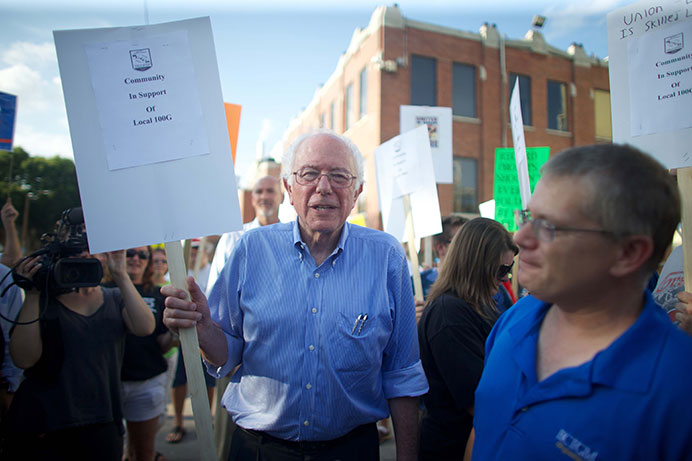I was once a part of a political revolution. A young, charismatic man was our leader; he promised change. He was going to reform the political system as we knew it, and he was going to do it with the groundswell of support driving his revolution. It was going to be amazing, a once-in-a-generation phenomenon.
Eight years later, I find my fellow millennials looking at another “political revolution,” led by a crazy-haired old white man. A socialist, he calls himself. A man who promises change, because the political system is still broken. Another man who, just like the great revolutionary before him ultimately did, will likely fail to keep his promises.
It’s an imperfect analogy, yes, but it is one that surprisingly works. The parallels between our first revolutionary of 2008, Barack Obama, and the most recent beacon of liberal hope, Bernie Sanders, should be obvious. Which means that the lessons America learned from Obama’s successes, and failures, should apply to a theoretical Sanders presidency.
Just what do those lessons tell us? They tell us that, without a Democratic majority in the House and Senate, the extremely liberal policy promises Sanders offers will likely be broken. That’s because real change does not happen simply by electing one man. Simply look at President Obama’s greatest political policy achievement, the Affordable Care Act. It was passed before the GOP officially took over in 2010. It was passed with absolutely zero, I repeat, zero Republican votes.
While compromises can be achieved, I question whether the headstrong Sanders — whose unwavering passion behind his beliefs is a part of his appeal — will be willing to concede points in a negotiation with leading congressional Republicans over a hypothetical single-payer health-care bill. And if he does, whether his supporters will be content with the compromise.
So, how do we achieve change in politics? How can we make liberal dreams — like a single-payer health-care system, affordable higher education, criminal-justice reform, or gender equality — a reality?
If the Republican Party has taught American anything since the Reagan era, it is that you achieve change in 2018, not 2016. The midterm elections, where citizens line up to vote for the less sexy, less inspiring positions of U.S. senator, House representative, state senator, or city mayor are decided. The Republicans have created political change by showing up to the polls during those elections, which allows them to be uncompromising when they sit down on the negotiation table. Why would they, after all, concede to a Democrat when they remain theoretically uncontested during their re-election campaigns?
Liberals, on the other hand, have failed to show up to the polls on these off years, which is why we find the like of Sen. Joni Ernst in Iowa. We lack the bargaining position that comes with numbers, and it’s why no “political revolution” in 2016 will result in a whole lot of change.
After all, once the excitement of “Feeling the Bern” subsides, all my fellow millennials — or, more broadly, my fellow liberals — will fail to show up come the midterm elections. They did in 2010, and again in 2014. When they don’t, America will remain where we stand today: gridlocked. Then the country will become disenchanted with a man who promised change, yet stands no chance against a political environment that punishes compromise.
Adam Babinat



